How to submit an abstract
Abstract submission is now closed for 2016
If you have submitted an abstract but have not received a confirmation emall from the conference office please contact us to make sure we have received it.
Abstracts are are invited for:
Core and theme paper presentations
Symposia
Oral poster presentations
 Three categories of core and theme paper presentations to choose from: Three categories of core and theme paper presentations to choose from:
Research presentations; Innovation presentations and Issues for debate
For the full information about the new categories please go to: Abstract information
Please contact the conference office with any queries you may have on
00 44 (0) 1954 252020
There are 4 types of abstract you can submit which are listed below. Please click on these to be taken to the full instructions of the submission process:
Core paper abstract
Your core paper abstract should:
 set a high standard for other papers set a high standard for other papers
 display academic scholarship via conceptual analysis, innovation or research display academic scholarship via conceptual analysis, innovation or research
 demonstrate evidence of understanding of current issues and relevant debates demonstrate evidence of understanding of current issues and relevant debates
 consider transferability to a variety of settings and healthcare professions consider transferability to a variety of settings and healthcare professions
 generate new insights to stimulate discussion generate new insights to stimulate discussion
 address the interests of an international audience. address the interests of an international audience.
Abstracts for core paper presentations must:
 be submitted under one of the three new categories: Research, Innovation or Issues for debate be submitted under one of the three new categories: Research, Innovation or Issues for debate
 be relevant to the theme be relevant to the theme
 be written using the structured headings in the relevant downloadable Word template be written using the structured headings in the relevant downloadable Word template
 be between 400–600 words (excluding references) be between 400–600 words (excluding references)
 be written in English be written in English
 be free from jargon, any ‘shorthand’ and abbreviations, which should be spelt out in full. Bear in mind that delegates from other countries will not always be familiar with your healthcare and educational systems, so brief explanations should always be given be free from jargon, any ‘shorthand’ and abbreviations, which should be spelt out in full. Bear in mind that delegates from other countries will not always be familiar with your healthcare and educational systems, so brief explanations should always be given
 include full references, as appropriate, using the Harvard referencing style include full references, as appropriate, using the Harvard referencing style
 include the names, job titles and institutions of all authors, with full address and contact details of the main correspondent include the names, job titles and institutions of all authors, with full address and contact details of the main correspondent
 include up to five key words that will enable reviewers to confirm the fit to your chosen theme include up to five key words that will enable reviewers to confirm the fit to your chosen theme
 list three bullet points that indicate how your work contributes to knowledge development in the selected theme list three bullet points that indicate how your work contributes to knowledge development in the selected theme
 be submitted to the NET conference office by Monday 25 January 2016. be submitted to the NET conference office by Monday 25 January 2016.
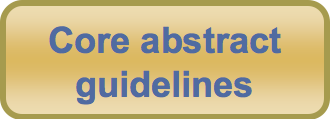 For full guidelines on preparing and submitting a core presentation abstract click here. For full guidelines on preparing and submitting a core presentation abstract click here.
| Here's how to submit your core paper abstract: |
- Select the category you will submit to: Research, Innovation or Issues for debate -
click here to see more information about the categories
- Each of the three categories has its own word template with structured headings which you need to download to complete your abstract -
click here to go to the templates
- Make sure you have chosen the theme that is most relevant for your abstract -
click here to see the list of themes
- Now you can submit your abstract by completing a submission form -
click here to submit your abstract
(Please note that after clicking the ‘Submit’ button on the form you should immediately see the window shown below. If you do not see this window your submission may not have been successful and you should either try to submit your abstract again or contact the NET conference office)
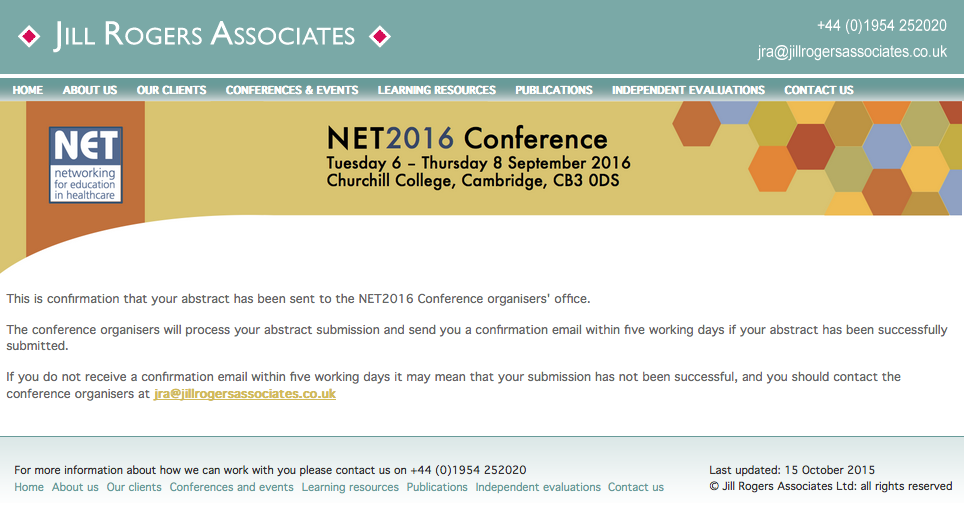
|
Back to top
Theme paper abstract
Your theme paper abstract should:
 reflect academic rigour and scholarship reflect academic rigour and scholarship
 demonstrate evidence of understanding of current issues and relevant debates demonstrate evidence of understanding of current issues and relevant debates
 consider transferability to a variety of settings and healthcare professions consider transferability to a variety of settings and healthcare professions
 show clear implications for healthcare education tomorrow show clear implications for healthcare education tomorrow
 address the interests of an international audience. address the interests of an international audience.
Abstracts for theme paper presentations must:
 be submitted under one of the three new categories be submitted under one of the three new categories
 be relevant to the theme be relevant to the theme
 be written using the structured headings in the relevant downloadable Word template be written using the structured headings in the relevant downloadable Word template
 be between 400–600 words (excluding references) be between 400–600 words (excluding references)
 be written in English be written in English
 be free from jargon, any ‘shorthand’ and abbreviations, which should be spelt out in full. Bear in mind that delegates from other countries will not always be familiar with your healthcare and educational systems, so brief explanations should always be given be free from jargon, any ‘shorthand’ and abbreviations, which should be spelt out in full. Bear in mind that delegates from other countries will not always be familiar with your healthcare and educational systems, so brief explanations should always be given
 include full references, as appropriate, using the Harvard referencing style include full references, as appropriate, using the Harvard referencing style
 include the names, job titles and institutions of all authors, with full address and contact details of the main correspondent include the names, job titles and institutions of all authors, with full address and contact details of the main correspondent
 include up to five key words that will enable reviewers to confirm the fit to your chosen theme include up to five key words that will enable reviewers to confirm the fit to your chosen theme
 list three bullet points that indicate how your work contributes to knowledge development in the selected theme list three bullet points that indicate how your work contributes to knowledge development in the selected theme
 be submitted to the NET conference office by Monday 25 January 2016. be submitted to the NET conference office by Monday 25 January 2016.
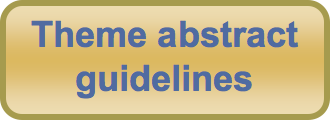 For full guidelines on preparing and submitting a theme presentation abstract click here. For full guidelines on preparing and submitting a theme presentation abstract click here.
| Here's how to submit your theme paper abstract: |
- Select the category you will submit to: Research, Innovation or Issues for debate -
click here to see more information about the categories
- Each of the three categories has its own word template with structured headings which you need to download to complete your abstract -
click here to go to the templates
- Make sure you have chosen the theme that is most relevant for your abstract -
click here to see the list of themes
- Now you can submit your abstract by completing a submission form -
click here to submit your abstract
(Please note that after clicking the ‘Submit’ button on the form you should immediately see the window shown below. If you do not see this window your submission may not have been successful and you should either try to submit your abstract again or contact the NET conference office)

|
Back to top
Abstract categories and templates
The NET Organising Committee are always striving to improve the NET conference and to keep academic standards as high as possible and this year have introduced three categories of abstract for core and theme papers to reflect the richness of the papers presented at NET. Abstracts for both core and theme papers should be submitted under one of these new categories: Research, Innovation or Issues for debate. To help you decide which category your abstract relates to please see descriptions below.
Research presentations
Research papers should focus on the education of healthcare professionals and have implications for learning, teaching or assessment. They are intended as an opportunity to present a fully developed study, completed phase of a study, or a systematic review. Abstracts should, acknowledge, wherever possible, the international relevance of the research. The study, or phase of the study, must be complete with appropriate data and findings available by the time of presentation.
Innovation presentations
Innovation papers are intended as an opportunity to present educational innovations/developments that have been implemented in one or a small number of sites and their contribution and value assessed. These papers are intended to trigger debate about how smaller-scale innovations may be useful in other settings. They may include reports of innovations in clinical practice, together with any implications for educational development and change.
Issues for debate
Papers presented in this category offer an opportunity to present a scholarly, conceptual, evidence-based, reflective perspective on a contemporary educational issue. Papers in this category should be well referenced, tightly structured and robustly argued. They should be designed to stimulate debate about the key issue(s) raised.
Templates
When submitting your abstract please use the structured headings within the templates that have been prepared for each category and are available below.
Please note these templates are for both core and theme paper abstracts, so please download your chosen category template whether you are submitting a core or a theme abstract. You will be able to indicate whether it is a core or theme abstract as you complete the submission form online.
Download the templates here
|
 |
 |
 |
Back to top
| Conference themes |
|
Developing the future healthcare education workforce
This theme focuses on the healthcare education workforce. How can we best support and develop educators? What is the place of identity, integrity and reflective practice in a context where learning and teaching, research and student experience can exert conflicting demands?
Education in clinical practice and practice development
Innovative practice and research in practice education and in practice development are at the heart of this theme group. Papers should explore the challenges of linking practice with theory and how to best apply knowledge in the practice setting.
Educational innovation and enhancement
Educators are expected to generate fresh ideas: innovation needs to be embedded in educational curricular and programmes. Papers should include evidence, the context of the innovation or enhancement and address novel approaches to the curriculum.
E-learning/blended learning
Papers examining the use of technology to enhance students’ learning experience, including innovative programmes, best practice and the systematic evaluation of e-learning/blended learning contribute to this theme.
Humanising healthcare education
Explores issues relating to the preparation of healthcare professionals. How can learning and teaching promote critical thinking and meaningful debate and dialogue? Papers should demonstrate ways in which education can enhance understanding of ‘what it means to be human’ and of compassionate and person-centred care.
Internationalisation and global challenges in healthcare education
Examines the experiences of working and delivering educational programmes across countries and continents, including evaluation of the cultural impact, key insights, benefits and challenges.
Interprofessional learning and working
Multiprofessional developments in health and social
care are at the heart of this theme. Evidence of critical understanding of interprofessional learning and analysis of international research and models are important.
Leadership in healthcare education
Focuses on the challenges of developing leaders in education, practice and research, the skills and support needed, succession planning, and key issues facing today’s leaders. How can we best support the development of future leaders in education?
Learning and teaching strategies
This theme is concerned with the shift from teaching to the facilitation of learning and will debate the most effective strategies in healthcare education, particularly at a time of rapid change and economic constraint.
Partnership working
Partnership working permeates health and social
care policy, particularly in healthcare education with partnerships between education and service providers. Papers should explore experience, impact and outcomes of partnership working and include evaluation data wherever possible.
Research in healthcare education
A focus on research and the evidence base for healthcare education. Debates about research methodologies and research methods will be central to discussions in this theme.
Service user and carer engagement
The participation of service users and carers in the development and provision of services is central to effective delivery. But what is the reality of service user and carer participation? How do educators demonstrate that service users and carers are genuinely at the centre of the design, development and delivery of learning?
Social, economic and policy drivers in healthcare education
This theme focuses on the imperative for healthcare educators to respond to key social, political and economic drivers. How does current policy influence local structures?
Student experience and engagement
Papers must place the student at the centre of the debate. Research evidence relating to the student experience will contribute to this theme wherever possible.
Using simulation to enhance learning
This theme focuses on how simulation contributes
to effective and innovative education and service development. What are the challenges in assessing simulated learning and integrating it within the curriculum? How is simulation used across
the healthcare professions?
|
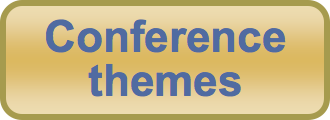 For a downloadable version of these conference themes: For a downloadable version of these conference themes:
Back to top
Symposium abstract
Symposia presentations do not need to be linked to any of the conference themes. A symposium should typically consist of three papers with a shared focus and no more than four shorter papers.
We suggest your symposium title should give a clear indication of the subject matter, but should also be appealing to your audience – the symposia are presented concurrently so delegates are only able to attend one so make sure they choose yours!
Your symposium abstract should:
 reflect academic rigour and scholarship reflect academic rigour and scholarship
 demonstrate evidence of understanding of current research and relevant debates demonstrate evidence of understanding of current research and relevant debates
 consider transferability to a variety of settings and healthcare professions consider transferability to a variety of settings and healthcare professions
 show clear implications for healthcare education tomorrow show clear implications for healthcare education tomorrow
 address the interests of an international audience. address the interests of an international audience.
Abstracts for symposium presentations must:
 be a single abstract be a single abstract
 include an outline and objectives for the proposed symposium include an outline and objectives for the proposed symposium
 itemise the individual papers and their author(s) itemise the individual papers and their author(s)
 clearly demonstrate how the papers link together clearly demonstrate how the papers link together
 be no more than 1,000 words in total (excluding references) be no more than 1,000 words in total (excluding references)
 be written in English be written in English
 be free from jargon, any ‘shorthand’ and abbreviations, which should be spelt out in full. Bear in mind that delegates from other countries will not always be familiar with your healthcare and educational systems, so brief explanations should always be given be free from jargon, any ‘shorthand’ and abbreviations, which should be spelt out in full. Bear in mind that delegates from other countries will not always be familiar with your healthcare and educational systems, so brief explanations should always be given
 include full references, as appropriate, using the Harvard referencing style include full references, as appropriate, using the Harvard referencing style
 include the names, job titles and institutions of all authors, with full address and contact details of the main correspondent include the names, job titles and institutions of all authors, with full address and contact details of the main correspondent
 be submitted to the NET conference office by Monday 25 January 2016. be submitted to the NET conference office by Monday 25 January 2016.
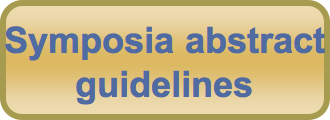 For full guidelines on preparing and submitting a symposium abstract click here. For full guidelines on preparing and submitting a symposium abstract click here.
| Here's how to submit your symposia abstract: |
- Nominate one person as the main correspondent
- Now complete your abstract, taking into account the above points
- Submit your abstract complete the submission form at: Submit your abstract
(Please note that after clicking the ‘Submit’ button on the form you should immediately see the window shown below. If you do not see this window your submission may not have been successful and you should either try to submit your abstract again or contact the NET conference office)

|
Back to top
Oral poster presentation abstract
Posters must address topical and innovative issues relating to the future of healthcare education – they do not need to relate to this year’s conference themes. They also allow you to present preliminary findings or to explore a project/study that may not yet be complete. Posters may include reports of clinical practice developments, provided they include implications for educational development and change.
Your oral poster presentation abstract should:
 make clear the focus of the poster make clear the focus of the poster
 where relevant, identify research approaches and any underlying evaluation where relevant, identify research approaches and any underlying evaluation
 address an issue in healthcare education, not necessarily one of the conference themes address an issue in healthcare education, not necessarily one of the conference themes
 consider transferability to a variety of settings and healthcare professions consider transferability to a variety of settings and healthcare professions
 show clear implications for healthcare education tomorrow show clear implications for healthcare education tomorrow
 address the interests of an international audience. address the interests of an international audience.
Abstracts for oral poster presentations must:
 be between 300–400 words (excluding references) be between 300–400 words (excluding references)
 be written in English be written in English
 be free from jargon, any ‘shorthand’ and abbreviations, which should be spelt out in full. Bear in mind that delegates from other countries will not always be familiar with your healthcare and educational systems, so brief explanations should always be given be free from jargon, any ‘shorthand’ and abbreviations, which should be spelt out in full. Bear in mind that delegates from other countries will not always be familiar with your healthcare and educational systems, so brief explanations should always be given
 include full references, as appropriate, using the Harvard referencing style include full references, as appropriate, using the Harvard referencing style
 include the names, job titles and institutions of all authors, with full address and contact details of the main correspondent include the names, job titles and institutions of all authors, with full address and contact details of the main correspondent
 be submitted to the NET conference office by Monday 25 January 2016. be submitted to the NET conference office by Monday 25 January 2016.
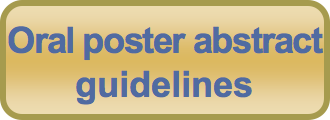 For full guidelines on preparing and submitting an oral poster presentation abstract click here. For full guidelines on preparing and submitting an oral poster presentation abstract click here.
| Here's how to submit your poster abstract: |
- Nominate one person as the main correspondent
- Now complete your abstract, taking into account the above points
- Submit your abstract complete the submission form at: Submit your abstract
(Please note that after clicking the ‘Submit’ button on the form you should immediately see the window shown below. If you do not see this window your submission may not have been successful and you should either try to submit your abstract again or contact the NET conference office)

|
Back to top
|
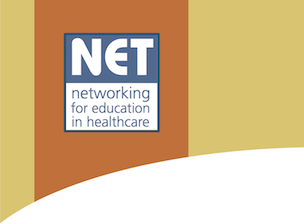
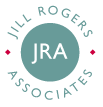


 Three categories of core and theme paper presentations to choose from:
Three categories of core and theme paper presentations to choose from: